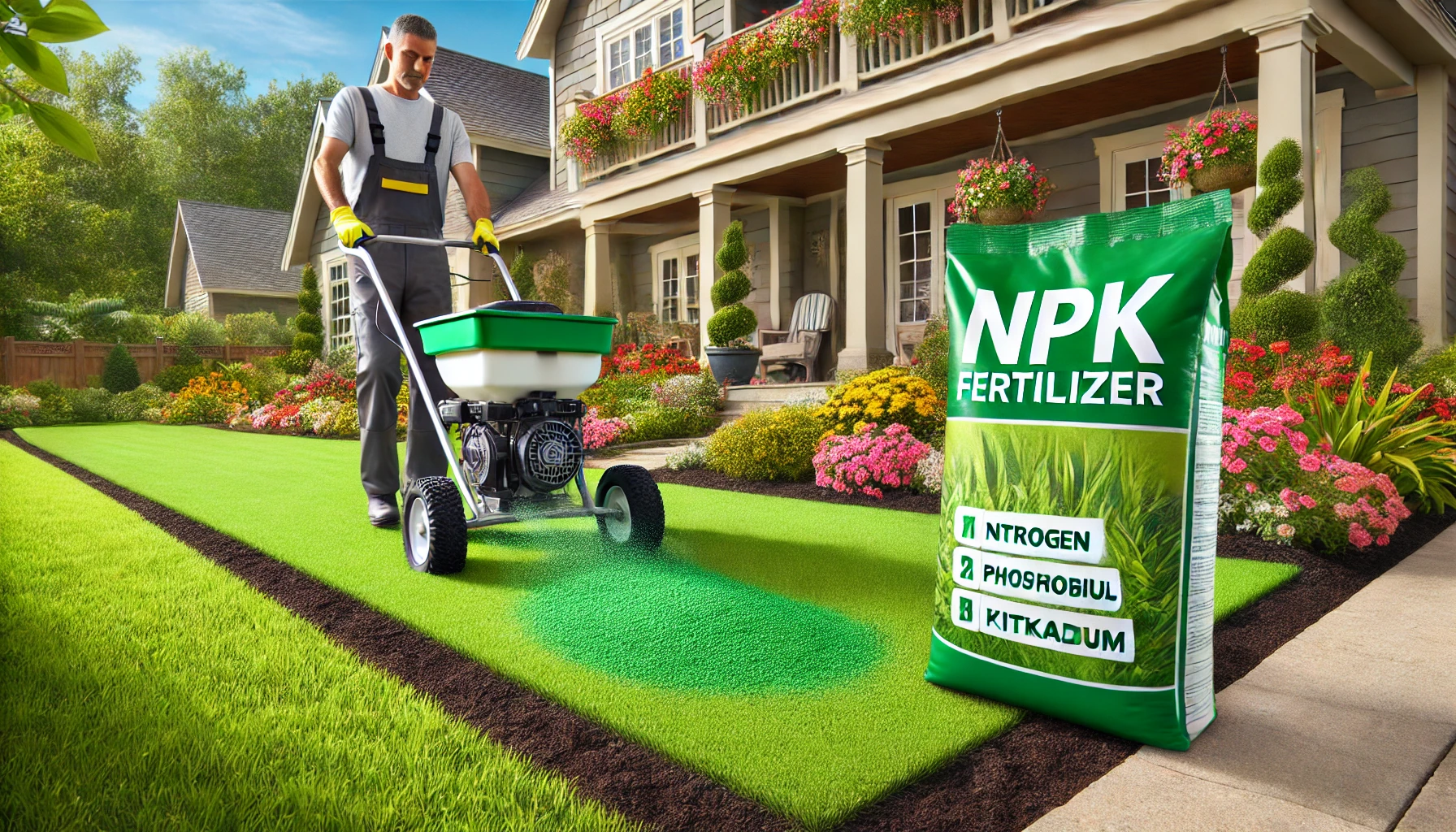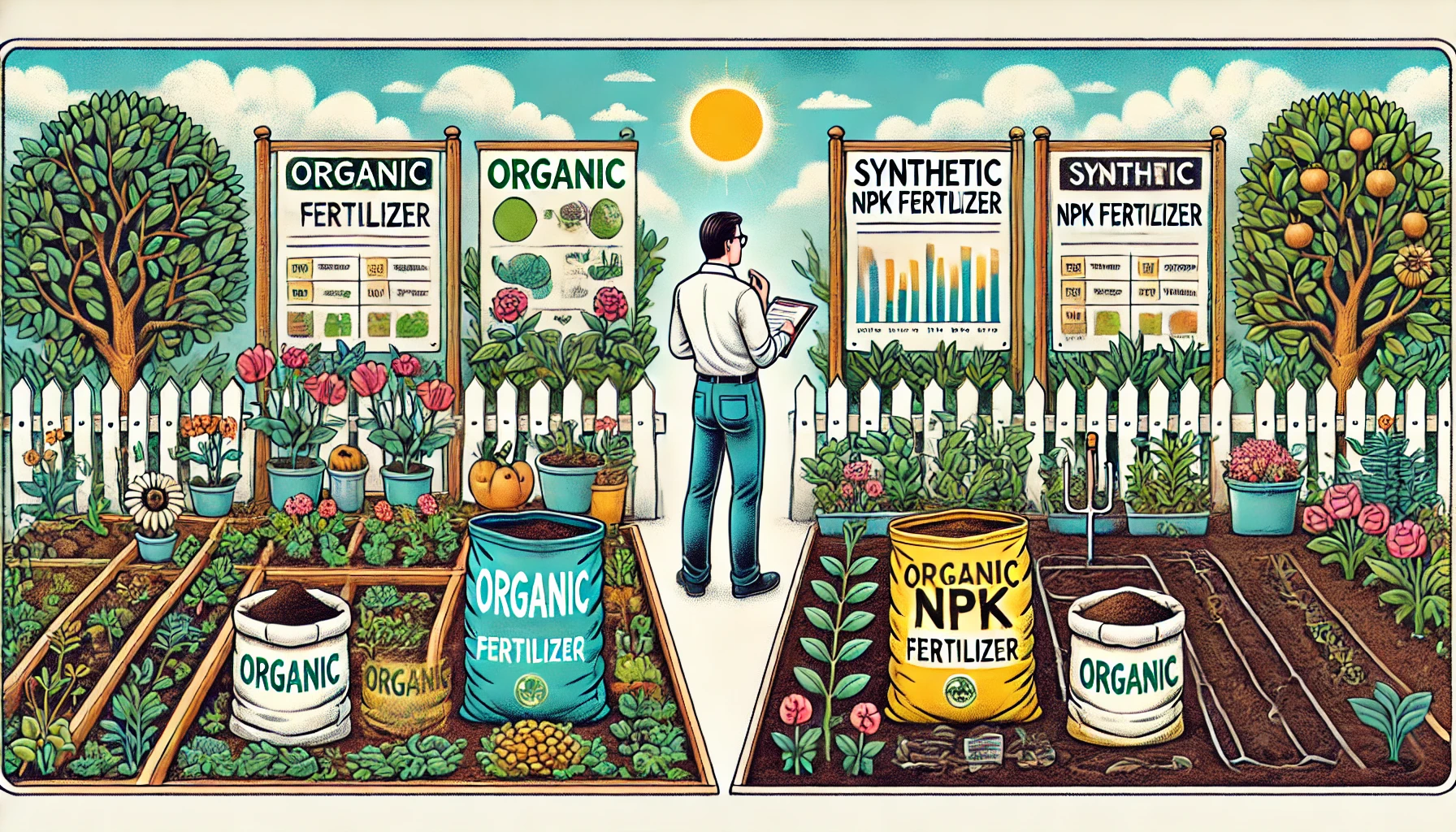
Fertilizers are an essential part of gardening and agriculture, helping plants receive the nutrients they need to grow strong and healthy. But with the wide variety of fertilizers available, it can be overwhelming to decide which is best for your garden. Should you use organic fertilizers, which are derived directly from natural sources and include natural fertilizers, or synthetic fertilizers, manufactured through chemical processes? In this detailed guide, we’ll explore the pros and cons of both types of fertilizers and help you make an informed decision that aligns with your gardening goals, whether it’s improving soil health, boosting plant growth, or practicing sustainability.
What Are Organic and Synthetic Fertilizers?
Before diving into the benefits and drawbacks, it’s important to understand what sets organic fertilizers apart from their synthetic counterparts. Organically derived fertilizers are a type of organic fertilizers that come from natural decomposition processes facilitated by microbes soil bacteria and fungi.
Organic Fertilizers
Organic fertilizers are derived from natural organic sources, such as animal manure, compost, plant residues, rock phosphate, and other organic materials. These fertilizers are derived from plant or animal sources. They supply nutrients slowly over time as they break down through the activity of soil microbes. These fertilizers enhance soil structure by increasing organic matter and promoting the activity of beneficial microorganisms, which are essential for maintaining a healthy garden ecosystem.
Some common examples of organic fertilizers include:
-
Compost: Decomposed organic matter that improves soil texture and supplies a variety of nutrients.
-
Animal manures: Often sourced from farms, animal waste like cow, chicken, or horse manure is rich in nitrogen and helps boost soil fertility.
-
Blood meal: A high-nitrogen organic fertilizer made from dried animal blood.
-
Bone meal: Rich in phosphorus and calcium, it helps with root development and flowering.
-
Fish emulsion: A liquid fertilizer made from fish waste that provides a quick nutrient boost while still being organic.
Synthetic Fertilizers

Synthetic fertilizers, also known as chemical fertilizers, are created through industrial processes. These fertilizers are designed to deliver concentrated amounts of specific nutrients like nitrogen (N), phosphorus (P), and potassium (K)—often referred to as NPK. Synthetically derived fertilizers are created through industrial processes. Synthetically derived synthetic fertilizer often requires significant energy and advanced technology for production. Ammonium nitrate, ammonium phosphate, and urea are common ingredients in synthetic fertilizers, which are formulated for rapid results.
Some common synthetic fertilizers include:
-
Ammonium nitrate: A quick-release nitrogen fertilizer that promotes rapid plant growth.
-
Urea: A highly concentrated nitrogen fertilizer used to boost leaf growth.
-
Ammonium phosphate: Provides both nitrogen and phosphorus, ideal for early plant growth stages.
Key Differences Between Organic and Synthetic Fertilizers

|
Feature |
Organic Fertilizers |
Synthetic Fertilizers |
Inorganic Fertilizers |
|---|---|---|---|
|
Source |
Natural materials (animal waste, compost, rock phosphate) |
Chemically produced from petroleum and natural gas |
Chemically produced, often from minerals |
|
Nutrient Release |
Slow, gradual release through microbial activity |
Quick, immediate nutrient availability |
Concentrated, soluble nutrients, quick release |
|
Environmental Impact |
Promotes soil health, reduces pollution risks |
Can contribute to water contamination and soil degradation |
Potential to create a crust on the soil, risk of over-application |
|
Cost |
Often more expensive due to natural production processes |
Generally less expensive, widely available |
Generally less expensive, widely available |
|
Soil Health |
Improves soil structure and promotes microbial life |
May degrade soil quality over time if overused |
May degrade soil quality over time if overused |
Benefits and Drawbacks of Organic Fertilizers
Benefits of Organic Fertilizers
-
Improves Soil Structure and Health Organic fertilizers contribute to better soil structure by increasing organic matter and incorporating organic materials. This promotes water retention, improves soil aeration, and encourages the growth of beneficial microbes. Over time, regular use of organic fertilizers can build a healthier, more resilient soil ecosystem. This is crucial for long-term soil fertility, as well-structured soils allow plant roots to access nutrients more easily.
-
Sustainable and Environmentally Friendly Since organic fertilizers come from natural sources, they have a lower environmental impact. They help reduce the risk of water pollution and soil degradation. Organic fertilizers do not cause harmful runoff that can contaminate nearby water bodies like rivers and lakes, making them a better choice for environmentally conscious gardeners.
-
Rich in a Variety of Nutrients Unlike synthetic fertilizers, which often supply only one or two nutrients, organic fertilizers contain a wide variety of essential nutrients, including micronutrients and organic compounds. These nutrients improve soil quality and help plants grow more robustly.
-
Supports Soil Life Organic fertilizers feed soil organisms, such as earthworms and beneficial bacteria. These organisms break down organic matter, releasing nutrients slowly and steadily. This promotes the overall health of the soil, making it more productive in the long run.
Drawbacks of Organic Fertilizers
-
Slower Results Organic fertilizers release nutrients slowly because they rely on microbial activity to break them down. This means that they may not produce the rapid, noticeable results that synthetic fertilizers offer. If you’re looking for a quick boost during the growing season, organic fertilizers may not meet your needs.
-
More Expensive Organic fertilizers can be more costly than synthetic ones, mainly due to the natural processes involved in their production. Natural fertilizers often require a more labor-intensive production process and are more expensive. For large areas or gardens, the higher cost can be a concern, although the long-term benefits to soil health may outweigh the initial investment.
-
Inconsistent Nutrient Content The nutrient content in organic fertilizers can vary depending on the source. For example, the nutrient levels in compost or manure may be inconsistent, making it harder to calculate exact application rates.
The Pros and Cons of Synthetic Fertilizers

Pros of Synthetic Fertilizers
-
Quick Nutrient Availability Synthetic fertilizers provide quick-hit nutrients, delivering a rapid boost to plants. Synthetically derived fertilizer provides quick-acting nutritional benefits for plants. This is particularly useful when plants show signs of nutrient deficiencies or when you need fast results, such as promoting rapid greening of lawns or helping crops recover from stress.
-
Specific Nutrient Formulations Synthetic fertilizers are formulated to supply specific nutrients in precise ratios, such as high-nitrogen formulas for leaf growth or high-phosphorus formulas for flowering and fruiting. This allows for targeted fertilization, addressing specific nutrient deficiencies.
-
Variety of Forms Synthetic fertilizers come in a wide range of forms, including liquids, granules, powders, and spikes. This makes them highly versatile and easy to apply, whether you’re managing a small vegetable garden or a large area of farmland.
-
Cost-Effective Synthetic fertilizers are often less expensive than organic options, making them a more accessible choice for gardeners with large spaces or those on a tight budget.
Cons of Synthetic Fertilizers
-
Potential for Environmental Harm If overused or applied improperly, synthetic fertilizers can lead to nutrient leaching into water bodies, contributing to water pollution and eutrophication. Inorganic fertilizers, in particular, can exacerbate this issue due to their concentrated, soluble nature. This harms aquatic ecosystems and can result in dead zones in lakes and oceans.
-
Soil Degradation Over time, continuous use of synthetic fertilizers can degrade soil structure, depleting organic matter and reducing the activity of beneficial soil organisms. This can lead to poorer soil health and the need for increasing amounts of fertilizer to maintain plant growth.
-
Short-Term Benefits While synthetic fertilizers provide rapid results, they do not improve long-term soil fertility. Once the nutrients are used up, plants may struggle without additional applications, leading to a dependency on chemical inputs.
-
Toxicity Risks Excessive application of synthetic fertilizers can result in plant burn or toxicity, where too much of a nutrient, especially nitrogen, can damage plant roots and foliage.
Choosing the Right Fertilizer for Your Garden
When choosing between organic and chemical fertilizer and synthetic fertilizers, several factors come into play. Here’s what to consider:
-
Plant Nutrient Needs Different plants have varying nutrient requirements. For example, leafy vegetables like lettuce benefit from nitrogen-rich fertilizers, while flowering plants like tomatoes require more phosphorus. Synthetic fertilizers may be preferable for targeting specific nutrient deficiencies, but organic fertilizers are better for overall soil health and long-term productivity.
-
Soil Type and Condition Conducting a soil test can help you determine your soil’s nutrient levels and pH. For acidic soils, lime or organic compost can help adjust pH and improve soil structure. Organic fertilizers are generally better for improving poor soil quality, while synthetic fertilizers are often used in well-established garden soils.
-
Long-Term vs. Short-Term Goals If you’re focused on long-term soil health and sustainability, organic fertilizers are the way to go. However, if you need a quick nutrient boost, especially during the growing season, synthetic fertilizers may be more practical.
-
Environmental Concerns Organic fertilizers are more environmentally friendly, reducing the risk of toxic chemical runoff. If environmental impact is a priority, opt for organic fertilizers and slow-release formulas to avoid contributing to soil and water pollution.
Case Study: The Transition to Organic Fertilizers
Many gardeners and property owners are making the switch from synthetic to organic fertilizers, recognizing the long-term benefits to soil health and the environment. One such example is Paul James, a home gardener in Texas, who transitioned from using synthetic fertilizers to a combination of compost, bone meal, and fish emulsion. He reported that after two years, his soil was richer in organic matter, water retention improved, and his plants were more resilient to diseases and pests. Organically derived fertilizers contributed to the improved soil health, water movement, and resilience observed by Paul James.
As James noted, “The initial investment in organic products seemed high, but over
time, I’ve seen a real improvement in soil fertility. My garden now requires less water and fewer pest treatments, making it more sustainable in the long run.”
Making the Switch to Organic Fertilizers
If you’re currently using synthetic fertilizers but want to transition to organic methods, here are a few tips:
-
Start Slow: Begin by incorporating organic fertilizers like compost and manure at the start of the growing season. Organic fertilizers from plant or animal sources can be gradually incorporated into the garden. Gradually reduce your reliance on synthetic products.
-
Monitor Soil Health: Keep an eye on soil structure and microbial activity. It may take time for organic fertilizers to break down, but the long-term benefits are worth the wait.
-
Combine Approaches: If needed, you can still use small amounts of synthetic fertilizers for specific nutrient boosts, but make organic products the foundation of your garden’s fertility program.
Environmental Impact and Cost Comparison
When it comes to the environmental impact, organic fertilizers are the clear winner all the nutrients. They promote healthy soil life, reduce pollution risks, and support sustainable agriculture. On the other hand, synthetic fertilizers pose risks to water quality and can contribute to soil degradation if used excessively. Additionally, synthetically derived fertilizers, with their higher concentration of nutrients, can further exacerbate these issues. Though synthetic fertilizers may be less expensive upfront, the long-term costs to soil health and the environment can outweigh the savings.
In terms of cost, organic fertilizers tend to be more expensive because of their natural sourcing and slower nutrient release. However, the improvements they bring to soil structure and fertility over time may reduce the need for additional inputs, saving money in the long run.
Ultimately, the choice between organic and synthetic fertilizers depends on your specific gardening goals, nutrient needs, and environmental priorities. With proper management and the right balance adding organic matter only, you can cultivate a thriving garden that is both productive and sustainable.
conclusion

In conclusion, both organic and synthetic fertilizers have their unique advantages and drawbacks, and the best choice for your garden depends on your specific needs and long-term goals. Organic fertilizers promote soil health, improve soil structure, and enhance the ecosystem by encouraging beneficial microbes and reducing environmental risks, making them a great option for sustainability and long-term soil fertility. On the other hand, synthetic fertilizers offer quick nutrient availability and cost-effectiveness, which can be beneficial for gardeners seeking immediate results or managing nutrient deficiencies. However, the potential for environmental harm, soil degradation, and dependency on chemical inputs should be carefully considered. A balanced approach that incorporates both types of organic ones other fertilizers, along with sound gardening practices like soil testing and composting, can help you achieve a healthy, productive, and environmentally responsible garden. Ultimately, making informed decisions about fertilizer use will benefit not only your plants but also the broader ecosystem.
